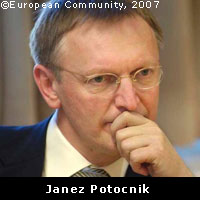Completing the ERA: a turning point in Europe's history, says Potocnik
Constructing a knowledge society in Europe could be as important as physical and economic reconstruction were after the Second World War, EU Science and Research Commissioner Janez Potocnik has said. 'I believe that we are standing at a point in Europe's history which could be as important as its reconstruction after the Second World War. Then the priority was peace [...]. Today, the priority is prosperity, with the mass construction of Europe's knowledge society,' the Commissioner told his audience at the Complutense University in Madrid, Spain, on 10 April. Mr Potocnik took this argument further, saying that in post-war Europe and during the ensuing decades, reconstruction depended upon trade in coal and steel. Today, Europe grows by trading knowledge. And it will continue to do so for decades to come, he said. To get the most from knowledge, Europe must first complete the establishment of a European Research Area (ERA), said the Commissioner. For this reason, a Green Paper was launched on 4 April, outlining what needs to be done to guarantee the free movement of knowledge. Knowledge is already on the move to some extent. The Commissioner quoted the Economist, which claimed recently that over 30% of the start-up companies founded in the US Silicon Valley since 1995 have been established by people of Indian or Chinese origin. Also, around 40% of those gaining PhDs in computer science and engineering from US universities are born outside of the US. The Commissioner is worried that Europe may fall behind. He has looked into the motivations for knowledge movement, and the results have provided clear goals for Europe. Mobility is usually prompted by opportunities to work with the best, find better jobs, focus on specialised areas, or use the best tools. For businesses, opportunities to tap into the best education systems, benefit from government support and access growing markets often influence decisions on where to invest and set up infrastructure. 'So the European Research Area is primarily about providing those opportunities - here in Europe,' said Mr Potocnik. In some cases this is merely a question of removing outdated barriers, while in others it requires financial support, for example to construct infrastructure. But in all cases, implementing changes requires a new mindset, 'one that understands the real importance of knowledge to how we will live in the future', the Commissioner told his audience. Key to the completion of the ERA is not only the right mindset, but the active involvement of all stakeholders, said Mr Potocnik. He pointed to the obvious players (the private sector, public funding organisations, universities, schools and public administrations), but also appealed for European citizens to get involved. It is they who can put pressure on their government over spending priorities and how welcome new students and researchers are, he said. Creating a real ERA means bringing together all of the players, linking all the stages of education and a research career, breaking down divides between disciplines, national and sectors, and providing knowledge-creators with the tools that they need, said Mr Potocnik. 'If we do that, we will at last have created a United States of Research in Europe,' he said. 'That is the next important construction Europe faces. That is our task. And now it's time to start work.'



